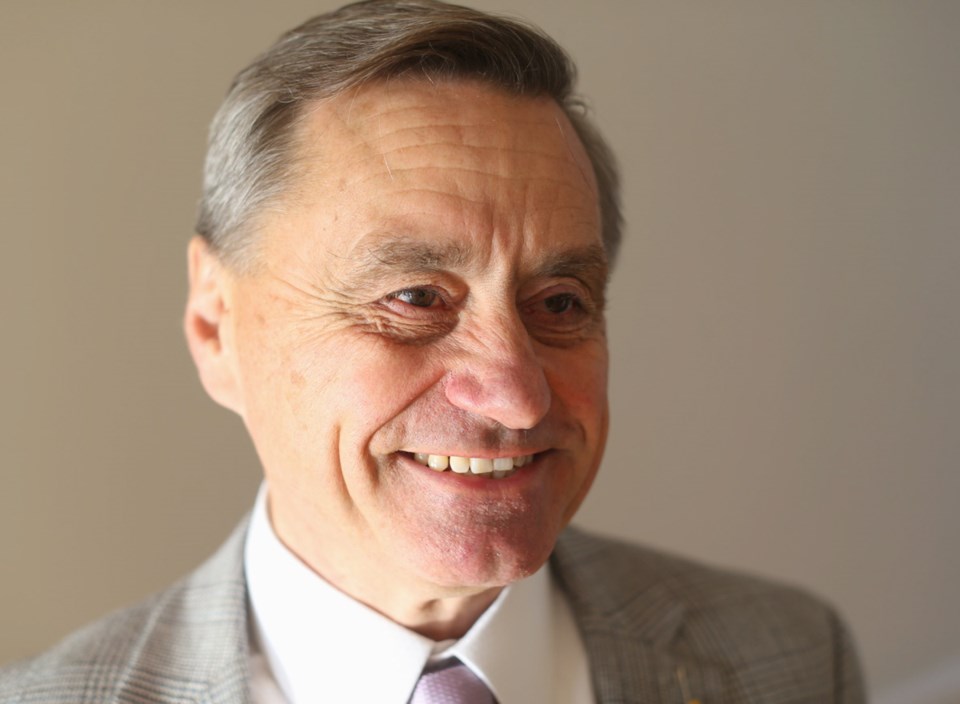After an hour of bewildering debate, Saanich council over-ruled Mayor Fred Haynes and ditched his plan to cancel amalgamation talks with Victoria due to the pandemic.
They had to fight their way through a lot of confusion before firmly shelving his idea. Proceedings got so complicated that Haynes wound up voting against two of his own motions. He also had to explain that the word “cancellation” doesn’t mean cancellation.
“The use of the word cancellation is exceedingly unfortunate because it’s been taken to mean cancelling the citizens’ assembly,” he said. “That is not the intent.”
That was during his protracted scramble to explain himself to colleagues who were suspicious of a surprise motion he put on the agenda last week for Monday night’s meeting.
It was to write Victoria and the provincial government informing them Saanich was ceasing any moves until further notice on the citizens’ assembly that was to study amalgamation.
The paperwork came under the heading: “Cancellation of Amalgamation Study.”
It was in response to the difficulties COVID-19 created for upcoming meetings on the topic. The assembly would have 75 members and getting together in person and holding hearings would be impossible.
Haynes insisted he just meant to “pause” or postpone the work done to date due to the emergency. “If I had to write it again, I would not use the word cancellation.”
But he had also recommended taking the $250,000 allocated for the work and using it elsewhere. As well, he planned to ask council to remove amalgamation studies from the municipality’s four-year strategic plan.
He told council by letter that citizen assembly meetings would be impossible for the foreseeable future.
“Decisions coming out of the Citizens’ Assembly — if amalgamation was the recommendation, would bring additional uncertainties possibly requiring a referendum on top of the uncertainty issues we are addressing with the COVID-19 pandemic and its recovery.”
Citing a “24 to 36 month timeframe,” he wrote, “we can no longer responsibly support this initiative at this time.”
Haynes said he gave no notice to Victoria because he wanted his council to see and discuss it first.
The more they talked about it, the less they liked it.
There was some initial acceptance of his explanation he just wanted a pause.
Haynes said they could have just “let it drift,” but he wanted to start debate on how the amalgamation study should respond to the health restrictions.
Coun. Rebecca Mersereau said of all the things on hold, the citizens’ assembly was the only one that was losing funding. “That unfortunately leaves me feeling like the only logical conclusion as to why is perhaps it’s a convenient opportunity for those who don’t support this initiative to remove funding for it.”
Coun. Ned Taylor said Haynes’ motion was obviously a proposal to cancel the amalgamation study, and he opposed it. “Despite what any member of council thinks about the idea of amalgamation, the public has asked us to look at this.”
Haynes said the motion in fact “is quite the opposite” of cancelling.
The gravity of the referendum vote made it appropriate to inform people that it can’t proceed at present, he said.
“I just can’t imagine how confusing this must be for members of the public,” Taylor remarked.
After most councillors spoke against, Haynes joined them in voting against it.
He later tried to table the motion, but councillors objected to the impression that would leave, so he joined them in voting against that idea, too.
Eventually they voted to ask staff to talk to Victoria about how the citizens’ assembly might proceed.
So the citizens’ assembly almost succumbed to COVID-19, but survived, for now.
It might even make the amalgamation idea stronger.
The financial nightmares Victoria and Saanich are just entering now will demolish every assumption ever made about local governments’ stability and fiscal capacity. A lot of those are relied upon by opponents of amalgamation who want to maintain the “business as usual” traditions.
They started evaporating a month ago. They’ll be gone completely by the time the tax shortfalls develop later this year. Amalgamation could become a more realistic option as the status quo vanishes.



